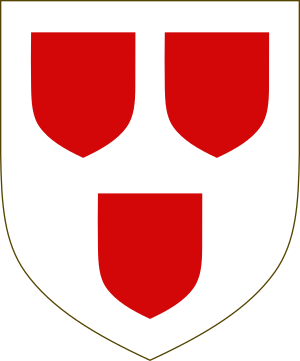Charles Hay, 13th Earl of Erroll facts for kids
Quick facts for kids
The Earl of Erroll
|
|
|---|---|

Arms of the Earl of Erroll
|
|
| 17th Lord High Constable of Scotland | |
| In office 1704–1717 |
|
| Preceded by | John Hay |
| Succeeded by | Mary Hay |
| Personal details | |
| Born | 1677 Errol, Scotland |
| Died | 16 October 1717 (age 40) |
| Parents | John Hay, 12th Earl of Erroll Lady Anne Drummond |
| Relatives | Mary Hay, 14th Countess of Erroll (sister) |
Charles Hay, 13th Earl of Erroll (1677 – 16 October 1717) was an important Scottish nobleman. He held the special role of Lord High Constable of Scotland, which was a very old and important position. He is best known for strongly disagreeing with the union that joined Scotland and England in 1707.
Contents
Who Was Charles Hay?
Charles Hay was born in 1677 in Errol, Scotland. He was the oldest son of John Hay, 12th Earl of Erroll, and his mother was Anne Drummond. His family was very important in Scottish history.
His Important Roles
When his father passed away, Charles became the 13th Earl of Erroll. This meant he inherited a special title and responsibilities. One of his most important roles was being the Lord High Constable of Scotland. This ancient job involved protecting the Scottish Parliament and keeping order. It was a very old position, passed down through his family for many years.
From 1704 to 1717, Charles also served as the Chancellor of King's College, Aberdeen. This meant he was a leader at one of Scotland's oldest universities. In 1705, he was made a knight of the Order of the Thistle. This was a special honor given by James Francis Edward Stuart, who was living in exile and claimed to be the rightful king.
Standing Up for Scotland
Charles Hay was very against the union of Scotland and England in 1707. This union meant that Scotland and England would become one country, Great Britain. Many people in Scotland, including Charles, worried about losing their country's independence and unique identity.
The Constable's Protest
As the Lord High Constable, Charles made a strong public statement against the union. He wanted to make sure that his important family role, which was tied to Scotland's independence, would not be harmed by the new union. He officially protested, saying that his office and its rights should stay "entire and unhurt." He asked for his protest to be officially recorded in the Parliament's documents.
Later Life and Legacy
Because of his strong views, Charles Hay was sometimes seen as a supporter of the Jacobite cause. The Jacobites were people who wanted the Stuart family to return to the throne. In 1708, during a time when there was a plan for France to invade, Charles was arrested. He was held in Edinburgh Castle because people suspected he might be involved.
Charles Hay passed away in 1717 when he was 40 years old. He never married and did not have any children. Because of this, his important title of Earl of Erroll passed to his sister, Mary Hay, 14th Countess of Erroll. She became the first woman to hold the title of Countess of Erroll in her own right.
 | Georgia Louise Harris Brown |
 | Julian Abele |
 | Norma Merrick Sklarek |
 | William Sidney Pittman |

